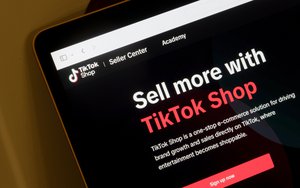Commentary
The TikTok Shop Effect In Search No One Wants To Discuss
- by Laurie Sullivan , Staff Writer @lauriesullivan, August 30, 2024

Social-media companies have turned into search engines in 2024, but brands and influencers — including U.S. presidential candidates — still don’t seem to think about having to do without TikTok. And, how the platform seemly prioritizes non-branded searches for products.
This is despite TikTok being tied to the People's Republic of China, and U.S. President Joe Biden signing a law that would ban TikTok unless its parent company ByteDance sells it by early next year.
Under the law, ByteDance must sell TikTok to an American buyer by January 2025. Failure to comply would result in a fine of $5,000 per U.S. user, totaling nearly $1 trillion.
Brands are not thinking about a possible sale or shutdown, but 84% of influencers are worried about their income, with 52% saying they are very concerned, according to a new report by First Insight. But brands aren’t really talking about it.
advertisement
advertisement
The First Insight study, released Wednesday, surveyed 435 creators with 10,000 followers or more whose content influences purchasing decisions.
The report found while 68% of retailers acknowledge that a TikTok ban could impact their business and conversion rates, only 28% have a contingency plan in place.
Eighty-two percent of retailers told First Insight they will increase advertising spend on Facebook if TikTok is banned, with both consumers and influencers believing that Facebook will be the dominant platform.
But there are other opportunities for platforms and their users in addition to Facebook, including Pinterest, Reddit, Etsy, LinkedIn, X and Snapchat. And then there's the Amazon marketplace.
Observing the shift in consumer behavior, 64% of TikTok influencers have identified an increase in engagement on other platforms, signaling that consumers may be preparing for life beyond TikTok sooner than marketers think.
There are more issues with the platform than some may realize, such as prioritizing TikTok Shop non-branded searches for products. This is similar to what Google has been accused of doing, in prioritizing search results for its companies. At least that is according to SOCI, a search marketing-technology platform, which notes the strategy could impact a brand’s strategy and impact brick-and-mortar retailers.
Search for “dress” or “sneakers” and you are served two videos related to TikTok Shop products with the option to click “view more products," which then takes the person clicking to the Shop section.
I’ve noticed many more posts on LinkedIn for B2B, B2C and personal posts that mention all types of topics from sharing recent purchases of dogs and awesome vacations to those who stroll down memory lane and share their experiences at specific companies or celebrate work anniversaries.
No one wants to talk about contingency plans on how they will market to consumers or other businesses if the U.S. government shuts down TikTok.
The biggest problem for all these other platforms is that they are still trying to determine how to surface products, services and messages without search.
Etsy this week signaled it has created a way to offer a new shopping experience that “makes buyers want to come back again and again” by surfacing items that are “high quality and from sellers who consistently provide delightful and reliable experiences.”
TikTok Shop buyers don’t want a delightful experience. They want beauty and skincare items, fashion and electronics, but not in a mundane way. They want something shocking and innovative.
The company in June launched a “Deals For You Days,” a promotion in July that took place in the U.S. L’Oréal, Maybelline New York, Our Place, Too Faced, and Zwilling U.S.A. were among the brands that participated to share their “glowy” products.
During the Data & Programmatic Insider Summit held last week in Lake Tahoe, one marketer said she can spend hours on the platform just looking around. I have not figured out the attraction to TikTok, but would like to know where brands plan to take their messages next.



